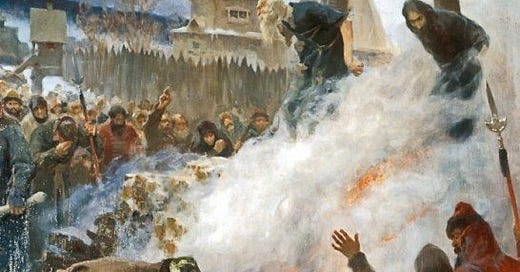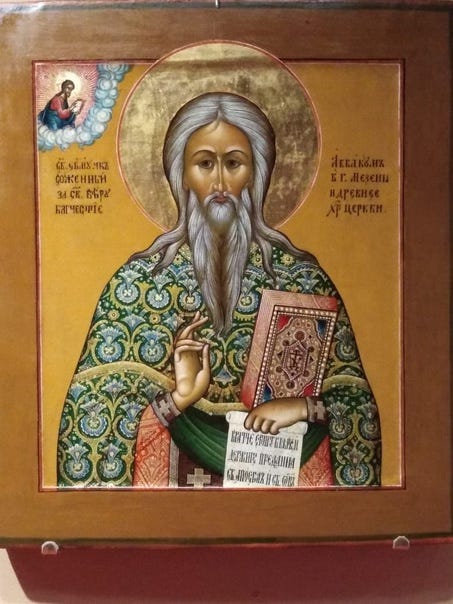The burning of the prisoners at Pustozersk happened on April 14 (24th on the civil calendar) - on Great and Holy Friday. Yes, the emperor had those who suffered for their faith burned alive for refusing to deviate from that faith on the very day of Christ’s crucifixion. The hideous evil of the reformers, chief of whom was the Tsar himself, is poetically obvious. This is a chapter from a book by Dimitry Urushev, a popular contemporary Old Believer author.
The greatest defender of the old faith was the priest-martyr and confessor Archpriest Avvakum. He was born in 1620 in the village of Grigorovo to the family of a priest named Peter. His countrymen included Patriarch Nikon and Bishop Paul.
Avvakum's father died early. His mother, a humble faster and prayerful woman, took over raising the children. When Avvakum turned seventeen, she decided to marry him off. At that time, the young man prayed to the Mother of God, asking for a wife—a helper unto salvation.
Avvakum's wife was the pious maiden Anastasia, the daughter of the blacksmith Mark. She loved the priest’s son and prayed to marry him. Through mutual prayers, they were united in marriage. Thus, Avvakum acquired a faithful companion who comforted and strengthened him in difficult times.
The newlyweds moved to the nearby village of Lopatishchi. According to the custom of that time, the son of a priest inherited his father's ministry, so at the age of 22, Avvakum was ordained as a deacon, and two years later as a priest of the church in Lopatishchi.
The young, zealous, and justice-loving priest incurred the wrath of the local leaders, whom he annoyed by advocating for orphans and the poor. Avvakum was beaten and then expelled from the village.
With his wife and newborn son, the priest headed to Moscow to seek protection. The clergy in the capital warmly received Avvakum. Archpriest John Neronov introduced him to Alexei Mikhailovich.
Having received a protection decree, Avvakum returned to Lopatishchi, but new troubles awaited him there. In 1652, the priest again went to the capital seeking justice. There, Avvakum was appointed as the archpriest to the cathedral of the small town of Yurievets. But here too, persecution awaited him. The local clergy, unhappy with the young archpriest’s strictness, incited the townspeople against him. Barely escaping death, Avvakum returned to Moscow.
When in early Lent of 1653 Patriarch Nikon sent out a decree to introduce new rituals, Avvakum wrote a petition in defense of the ancient church piety and submitted it to the tsar. The document reached the patriarch, who ordered the archpriest to be arrested and imprisoned.
Nikon wanted to strip Avvakum of his rank, but the tsar pleaded not to harm his acquaintance. Then the patriarch exiled the priest with his family to Tobolsk, Siberia. In the autumn of 1653, Avvakum, with his wife and children, embarked on the arduous journey.
In Tobolsk, Avvakum continued to preach, denouncing and reproaching Nikon. Soon, an order came from Moscow: Avvakum and his family were to be sent to a stricter exile—Yakutsk ostrog. But halfway there, a new command reached the archpriest: join the military expedition of Voivode Pashkov.
In the summer of 1656, Pashkov's detachment set out. For Avvakum, this became the most severe of trials yet. It seemed he would not survive this hell: hunger, cold, unbearable labor, diseases, the death of his children, and the voivode's disfavor.
However, in 1662, Avvakum received permission to return from exile. It took the priest and his family two years to reach Moscow. Seeing that services everywhere were conducted according to new books, Avvakum was disheartened. Tormented by heavy thoughts, he struggled between zeal for the faith and concerns for his wife and children. What to do? Defend the old faith or give up everything?
Anastasia Markovna, seeing her husband despondent, became worried:
"What has saddened you?"
"Wife, what to do? The winter of heresy is upon us. Should I speak up or remain silent? You have bound me!" Avvakum said in frustration.
But his wife supported him:
"Lord, have mercy! What are you saying, Petrovich? I bless you with the children. Be bold and preach the word of God as before, and do not worry about us. As long as God wills, we live together, and when separated, then remember us in your prayers. Go to church, Petrovich, denounce the heresy!"
Encouraged by the support of his beloved, Avvakum preached the word of God and denounced Nikon's innovations all the way to Moscow, in every town and village, in churches and markets.
In the spring of 1664, the exile reached the capital. Soon, news about him spread throughout the city. General respect and attention were drawn by the steadfastness of the righteous man, unbroken by the hardships of exile, and the greatness of his feat.
Tsar Alexei Mikhailovich himself received the archpriest and spoke kindly to him. Using this, Avvakum submitted two petitions to the tsar, urging him to abandon the new books and all of Nikon's initiatives.
The firmness of the priest irritated the sovereign. Soon, Avvakum was again sent into exile. Initially, he and his family were sent north to the remote Pustozyorsk ostrog. But on the way, he sent a letter to the tsar, pleading to spare his children and mitigate the punishment. The sovereign allowed Avvakum and his family to live in the large village of Mezen — near the White Sea.
In the spring of 1666, Avvakum was escorted to Moscow for a trial at the church council. The entire council urged the archpriest to accept the new rites and reconcile with their supporters, but he remained adamant:
"If it is God's will that I die, I will not unite with the apostates!"
After lengthy debates about faith, the archpriest was ignominiously stripped of his rank. Avvakum and three zealous defenders of Orthodoxy (Priest Lazar, Deacon Theodore, and Monk Epiphanius) were sentenced to confinement in Pustozyorsk ostrog. In December 1667, the Christian sufferers arrived at their final earthly refuge, which became a gruesome underground prison.
Avvakum spent many years in the dark dungeon, but his spirit did not falter. Sincere faith and ceaseless prayer sustained him. In Pustozyorsk, in the cold pit, in utter darkness, by the crimson smoky light of a torch, Avvakum wrote numerous letters to Christians, petitions to the tsar, and other compositions. Here, by the blessing of his spiritual father, Monk Epiphanius, the archpriest began his celebrated "Life."
To this day, in these writings, the voice of Saint Avvakum resonates loudly and vividly throughout Russia:
"Let us stand firm, brothers, let us stand courageously, let us not betray the faith. Though the Nikonians may attempt to sever us from Christ through torments and tribulations, is it sufficient for them to humiliate Christ? Our glory is Christ! Our affirmation is Christ! Our refuge is Christ!"
In 1681, the archpriest was accused of spreading writings against the tsar and the senior clergy. A dire command came to Pustozyorsk: "for great blasphemies against the royal house," burn Avvakum and his companions in a log cabin. On Great Friday — April 14, 1682 — Archpriest Avvakum, Priest Lazar, Deacon Theodore, and Monk Epiphanius were executed.




